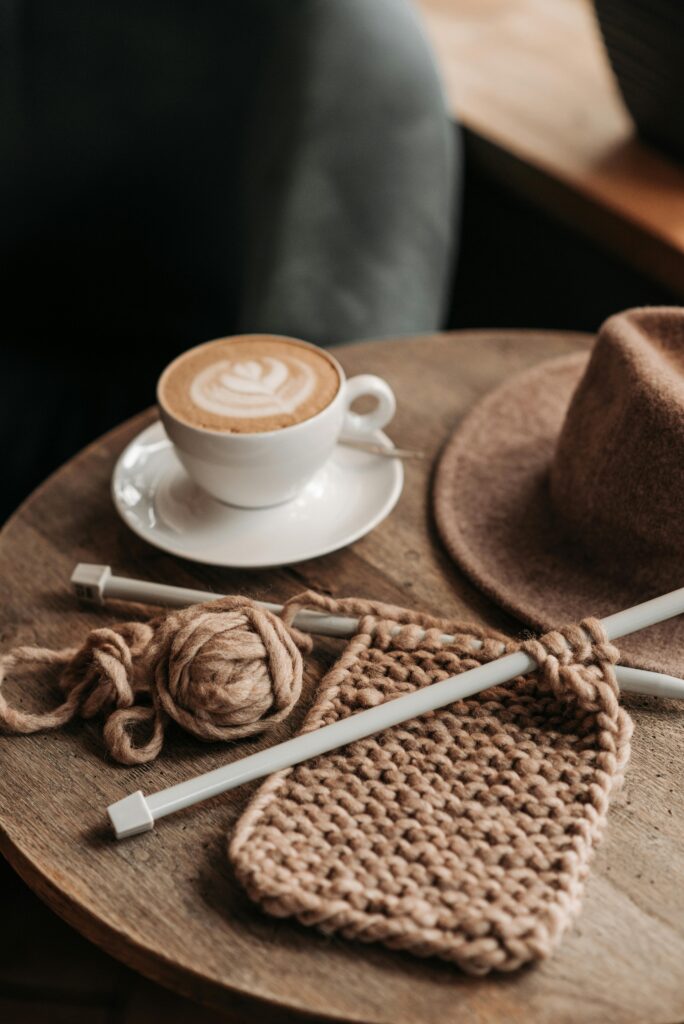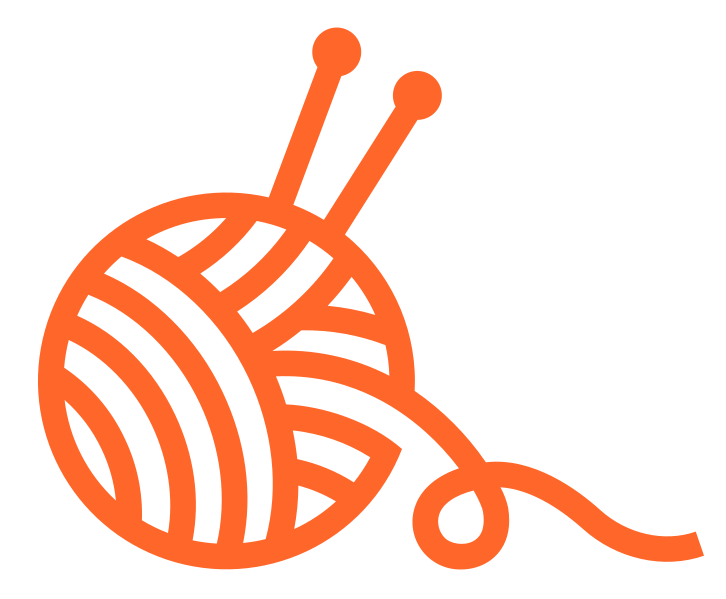Knitting is about so much more than creating cozy hats and sweaters. This blog post explores how recent research has shown that knitting can help your mental health. It can help you with mindfulness. It can also help you manage stress and boost your confidence. And it can help you feel connected with other people in your community. It may even reduce your risk of dementia. So if you haven’t started knitting yet, it’s a great time to start!
Mindfulness and stress relief
One of the most immediate benefits of knitting for mental health is its ability to calm the mind and reduce stress levels. In fact, knitting has been found to induce a relaxed state similar to meditating or doing yoga. And the repetitive action of knitting actually reduces stress hormones in the body.
Studies have also shown that engaging in knitting can even lower your heart rate and blood pressure. So knitting and mental health really are connected. And knitting is a very natural way to give your mental health a boost. This can be especially beneficial in today’s fast-paced world. These days, finding a moment of peace can sometimes seem impossible.
If you want to know more, you might be interested in the following studies.
A study published in the British Journal of Occupational Therapy found that 81% of respondents with depression reported feeling happy after knitting. More than half of them said they felt “very happy.”
Some studies have suggested that knitting can even serve as a form of therapy. One of these looked at people dealing with various mental health issues. These included post-traumatic stress disorder (PTSD), chronic pain, and eating disorders. Knitting provides a distraction from chronic pain. It can also help manage the symptoms of PTSD by providing a sense of normality and routine.
Cognitive benefits
Knitting does more for your brain than you might think. When you knit, you have to focus hard on patterns and counting stitches. This helps you get better at paying attention and not getting sidetracked. And this is a skill you can use in all parts of your life. Also, remembering the order of stitches and how to do different patterns can make your memory sharper.
But knitting isn’t just about following instructions. You often have to count, measure, and figure out how shapes fit together. This can make you better at solving problems and working with numbers. Plus, your hands and eyes have to work together when you’re knitting. This can make them work better together in other things you do. When you knit, you also have to use both of hands. Research has shown that activities using both hands stimulates both hemispheres of the brain, encouraging the development of new neural pathways.
Learning new knitting tricks or making up your own designs can even make your brain grow stronger connections. So, knitting is not just about making cool stuff. It’s also a great workout for your brain, helping to keep it sharp and healthy.
If you’re not yet convinced, you might want to find out more about the following studies.
Several studies have linked activities like knitting to reduced cognitive decline in older adults. The Mayo Clinic Study on Aging (2011) researched people aged 50 and older who did crafts like knitting. They discovered these adults had a lower chance of developing mild cognitive impairment and memory loss.
Research published in The Journal of Neuropsychiatry & Clinical Neurosciences (2007) found something similar. It suggested that older adults who do activities like knitting have a reduced risk of cognitive decline and dementia.
So if you’re not yet a knitter, it’s well worth giving it a go!

Improving your happiness
Finishing a knitting project feels amazing. This is a key aspect of how knitting benefits your mental health and wellbeing.
It’s really cool to see what you can make with just some yarn and knitting needles. Every time you knit, you’re using your own hands and ideas to make something unique. It could be something as simple as a dishcloth for your kitchen. Or it could be as fancy as a colorful sweater with lots of patterns. No matter what it is, when you’re done, you feel really proud. It’s like you’ve put a little piece of yourself into your project. Seeing the final result is super satisfying. So you feel more confident about yourself generally.
Connecting with the knitting community
The world of knitting is big and friendly, and full of people who love knitting. Whether they’re just starting out or have been knitting for years, there’s a place for everyone. You can meet other knitters in many ways. Online, there are websites and forums where people post pictures of their projects. Or sometimes, they ask for advice and share cool patterns. If you prefer meeting face-to-face, you might find local knitting clubs or group. In these clubs, people get together regularly to knit, chat, and learn from each other.
These knitting groups are great because they offer help and encouragement. If you’re stuck on a tricky part of your project, someone will likely know how to fix it. Plus, seeing what others are making can give you new ideas for your own projects. Sharing what you know is a big part of these groups, too.
This sense of belonging to a group again shows the positive impact of knitting on mental health.
But it’s not just about knitting. People in these groups can become close friends who share more than just knitting tips. You might find yourself supporting each other in life, not just in knitting. And many people find their knitting friends become an important part of their social life.
Whether online or in person, being part of the knitting community means you’re never knitting alone. You’re part of a big family of knitters who are all tied together by a love of creating something beautiful with nothing more than yarn and needles.
A personal note
On a personal note, knitting became a valuable coping mechanism for me during stressful times. I was taught to knit when I was about seven by my mum’s twin sister, Sheelagh. It was just before she emigrated to Canada. As we were still in the UK, we didn’t see her often. As we had been so close, it was knitting was a nice way of feeling in touch with her. And reflecting on this, it helps me to understand how knitting and mental health are entwined.
During my teens, I knitted a few wonky items. Back in the 70s, it was hard to find things I liked and could afford. So often I tried to make them instead! They didn’t always turn out as planned. But enough of them turned out sufficiently well to keep me involved. I picked up my needles again in my thirties, when I had quite a stressful job. And in the end, I changed it into a career and wrote over 20 knitting books!
What now?
More and more people are becoming aware that knitting offers a unique blend of mental, emotional, and social benefits. It’s a craft that can provide a sense of calm and boost confidence. It can also enhance cognitive abilities and connect you with a supportive community. Whether you’re rediscovering knitting after a break or are new to the craft, the world of knitting is rich with possibilities. So, why not pick up those needles and discover the myriad benefits that knitting has to offer your mental health?
If you want to check out more about knitting and mental health, I can personally recommend the following sites:
Therapeutic Knitting – a London-based psychologist dedicated to promoting the mental health benefits of knitting.
Betsan Corkhill – a life coach and author of ‘Knit for Health and Wellness’
